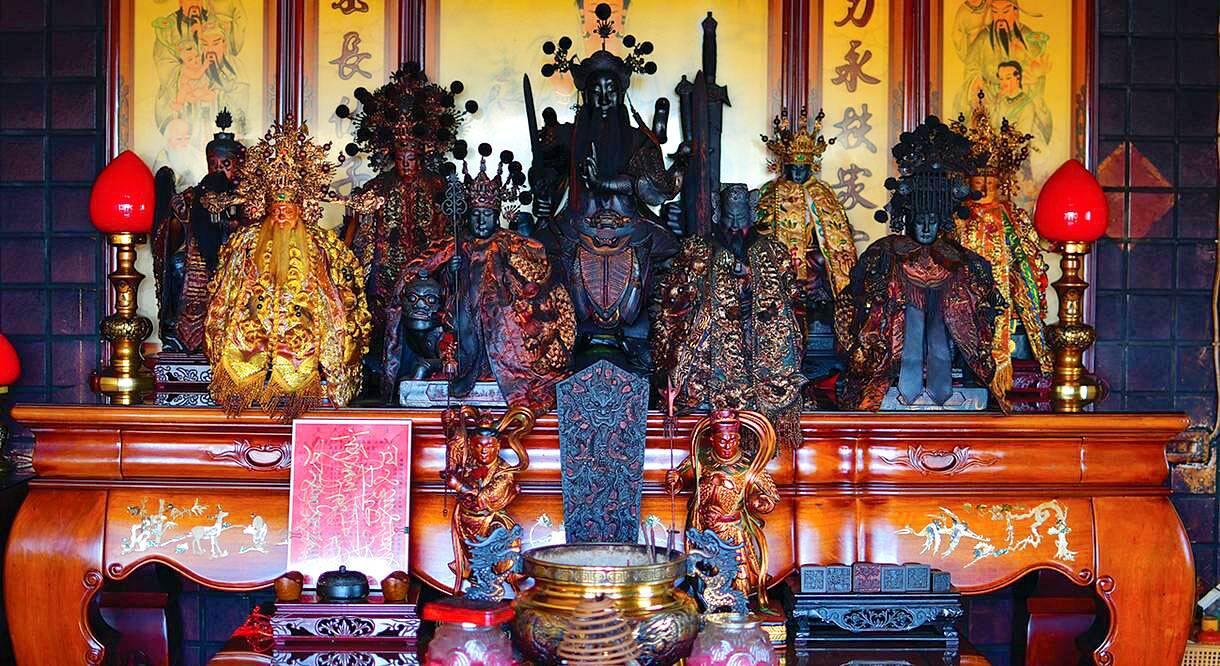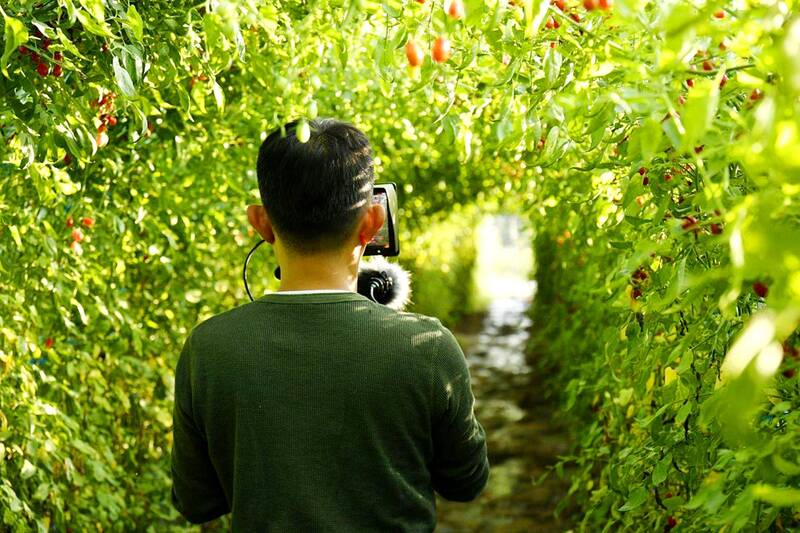In A Holy Family (神人之家), the members of the Lu family (盧) probably talk to the pantheon of 12 deities worshipped at the home altar more than they do each other. Mired in debt and suffering from poor harvests, they just go about life and pray that the gods will bring them luck.
Director Elvis Lu (盧盈良), who is the family’s youngest male child, has been estranged from them for two decades. The aging patriarch, who squandered most of the family’s property by gambling, is always looking at incense patterns or other signs that may reveal winning lottery numbers. Lu’s older brother is a farmer and spirit medium who relays advice from the deities to worshippers, while his mother makes daily offerings at the alter. Often alone at home, she says in one scene that the statues have become her friends.
Even the older brother’s son, who scoffs at his father’s superstitious behavior, begins crying and begs to ask the Emperor of the Mysterious Heaven (玄天上帝) what to do after a typhoon ruins their tomato crops.

Photo courtesy of iFilm Co
When his mother suddenly calls him at the beginning of the documentary, Elvis Lu’s first reaction is to ask if they need him to send them money.
Instead she tells him to come home, as she wants to discuss funeral arrangements. Lu initially plans to help them take funeral portraits, but soon begins filming their daily lives while asking very candid, straight-forward questions, which they are obviously unaccustomed to answering.
“Do you think the gods ever helped our family?” Lu responds when his brother asks him what he hopes to learn by filming the family and their attitude towards folk religion. “Or, are there really gods?”

Photo courtesy of iFilm Co
He also breaks the overwhelming emotional staleness by being honest himself, telling them what he thinks of them and why he didn’t return for so long. They know the reasons why, of course. But doing this seems to be deeply personal for the director, who says he did not have a documentary in mind when he first started shooting.
Their relationships change over what seems like a year or so of Lu returning several times to film. In the later half, Lu slowly starts appearing in the film (sometimes holding a giant camera) as he becomes more involved in the family story. This sort of slice of life story about the unspoken tensions and daily interactions (or lack thereof) in an ordinary family has become a staple of Taiwanese cinema over the past few years. The narrative is effective, as most people who grew up in a somewhat traditional Asian family can relate to the dynamic where affection and emotions are rarely expressed.
Yet it’s difficult to capture this sort of atmosphere through a documentary, as the subjects have to be willing to expose their private lives, which can be far from glamorous.
Lu mostly shoots as an outsider despite his access. Although the family often objects to his filming, he’s still treated as one of them — even though he himself might not feel like he is.
It’s all very subdued and there isn’t much drama or major epiphanies, but being brisker than many slow-burning epics of this genre such as A Sun (陽光普照), the shifts in atmosphere and character mood are more apparent and the story feels warmer.
Many films in this genre end by showing that some things never change, but in A Holy Family there’s a positive message of healing and self-realization that only fully sinks in after the film ends.

June 23 to June 29 After capturing the walled city of Hsinchu on June 22, 1895, the Japanese hoped to quickly push south and seize control of Taiwan’s entire west coast — but their advance was stalled for more than a month. Not only did local Hakka fighters continue to cause them headaches, resistance forces even attempted to retake the city three times. “We had planned to occupy Anping (Tainan) and Takao (Kaohsiung) as soon as possible, but ever since we took Hsinchu, nearby bandits proclaiming to be ‘righteous people’ (義民) have been destroying train tracks and electrical cables, and gathering in villages

Swooping low over the banks of a Nile River tributary, an aid flight run by retired American military officers released a stream of food-stuffed sacks over a town emptied by fighting in South Sudan, a country wracked by conflict. Last week’s air drop was the latest in a controversial development — private contracting firms led by former US intelligence officers and military veterans delivering aid to some of the world’s deadliest conflict zones, in operations organized with governments that are combatants in the conflicts. The moves are roiling the global aid community, which warns of a more militarized, politicized and profit-seeking trend

The wide-screen spectacle of Formula One gets a gleaming, rip-roaring workout in Joseph Kosinski’s F1, a fine-tuned machine of a movie that, in its most riveting racing scenes, approaches a kind of high-speed splendor. Kosinski, who last endeavored to put moviegoers in the seat of a fighter jet in Top Gun: Maverick, has moved to the open cockpits of Formula One with much the same affection, if not outright need, for speed. A lot of the same team is back. Jerry Bruckheimer produces. Ehren Kruger, a co-writer on Maverick, takes sole credit here. Hans Zimmer, a co-composer previously, supplies the thumping

Dr. Y. Tony Yang, Associate Dean of Health Policy and Population Science at George Washington University, argued last week in a piece for the Taipei Times about former president Ma Ying-jeou (馬英九) leading a student delegation to the People’s Republic of China (PRC) that, “The real question is not whether Ma’s visit helps or hurts Taiwan — it is why Taiwan lacks a sophisticated, multi-track approach to one of the most complex geopolitical relationships in the world” (“Ma’s Visit, DPP’s Blind Spot,” June 18, page 8). Yang contends that the Democratic Progressive Party (DPP) has a blind spot: “By treating any